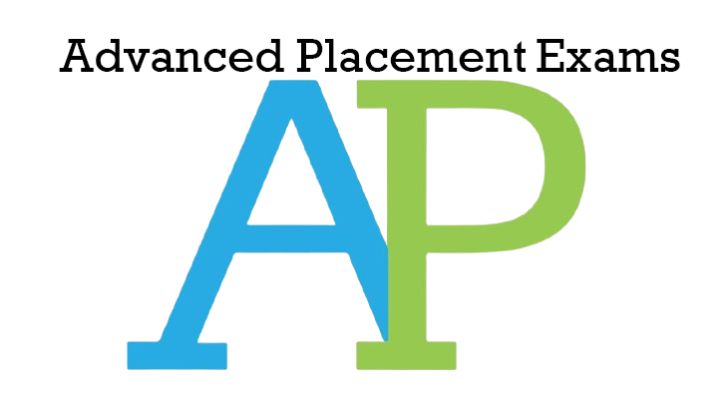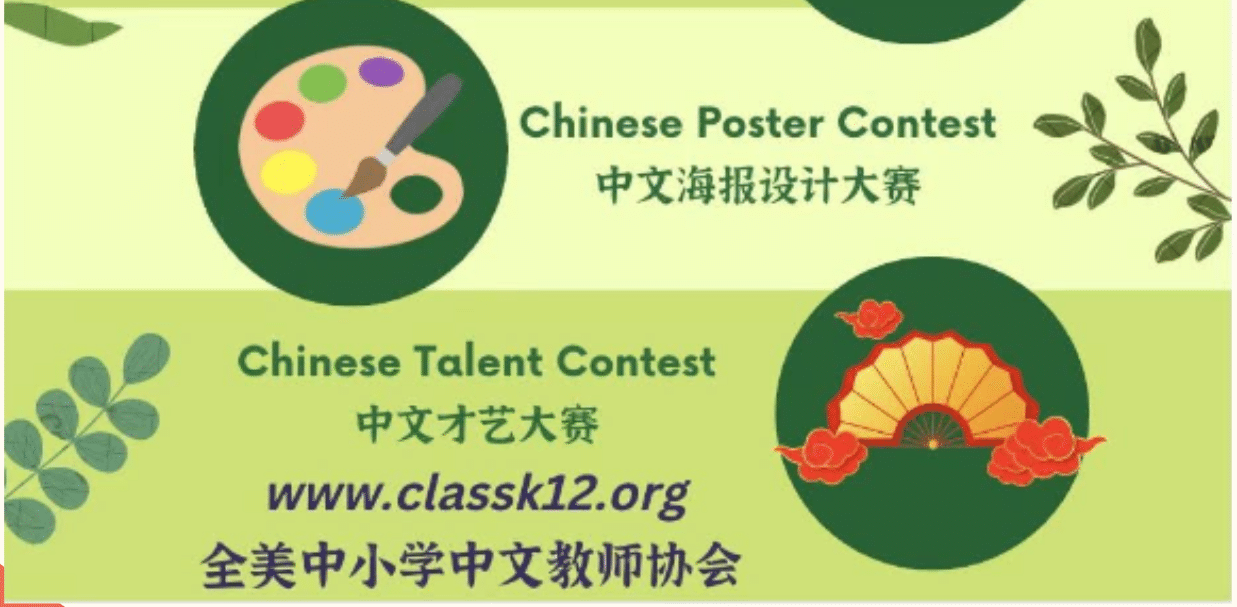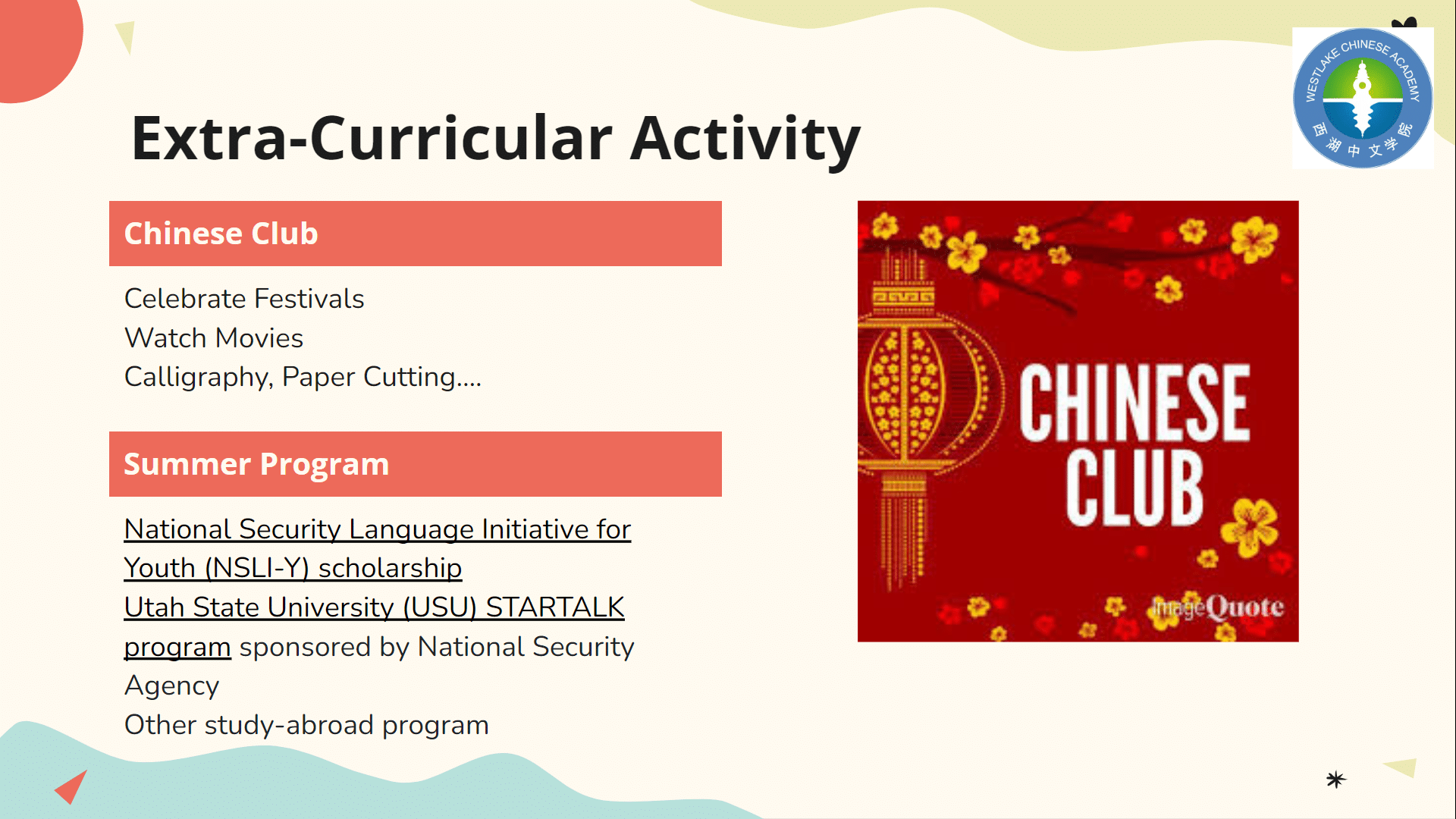Enhance College Application with Chinese Language and Culture Experience
Featuring Insider Resumes from Harvard, UC-Berkeley, Duke, UT-Austin Admits!
By Yang Wang at Westlake Chinese Academy | Updated On May 16th, 2025
We unfold this journey in two insightful sections. Initially, we dissect the college application process, showcasing how integrating Chinese language learning and cultural experiences can elevate each component of your application. Following this, we will delve into four compelling case studies. We present comprehensive resumes of former students successfully admitted to prestigious institutions such as UT-Austin, Duke University, UC-Berkeley, and Harvard.
A gentle reminder: all the info and analysis we're about to delve into is geared towards students navigating regular admission, early admission, and early action processes. Keep in mind, this might not directly apply to athletes who get recruited by college coaches with full scholarships. However, it's still relevant for the majority of athlete applicants who go through general admission channels.
Table of contents
ShowHideCollege Application Package
#1. Course and Exam
Now, let's talk about a crucial component of your application package: your high school course selection and grades. When it comes to high school level Chinese classes, having a minimum of three years under your belt can make a significant impact. However, we recommend aiming for four or five years to truly showcase your dedication and proficiency in the language. But how can you manage to fit more than four years of high school Chinese courses into your schedule? Well, one option is to start taking high school level courses in middle school, or you can opt for summer courses to supplement your learning. Here's an interesting fact that often goes unnoticed: very few students applying to Ivy-League colleges have Chinese courses listed on their transcripts. The majority tend to have studied Spanish or French. So, if you have Chinese courses on your transcript, it can really set you apart from the crowd.
So..Let's address a common question: why do so few students take Chinese classes in high school? Firstly, Chinese is often perceived as a challenging language compared to other foreign languages. However, the most significant reason is the limited availability of Chinese programs in high schools across the United States. Our team has spent two months extensively researching the course catalogs of all high schools in California. Can you guess what percentage of California high schools offer their own Chinese program? The correct answer is 12%. Despite California's sizable Asian population, only 12% of high schools in the state have a Chinese program. This statistic highlights the scarcity of Chinese language education, not only in California but also across the rest of the country.
Colleges pay close attention to students' course selections, particularly favoring those who challenge themselves with rigorous coursework. What exactly do we mean by "rigorous coursework"? Well, they include AP courses, other honors courses, and dual-credit courses. Now, why do colleges place such importance on course selection? In today's educational landscape, GPA inflation is rampant, with many students boasting a perfect 4.0 GPA. Here's a thought-provoking statistic: what percentage of American students do you think have an average GPA of A? The correct answer is 50%! Yes, you heard that right—half of all students in the United States have an average GPA of A. So, it's no surprise that highly selective colleges struggle to differentiate students based solely on their grades. That's precisely why they place such emphasis on the courses students choose, especially those that challenge them academically.
You might be wondering: if my child intends to pursue a STEM major in college, do foreign languages or other liberal arts or art courses still hold relevance? Absolutely. In today's admissions landscape, colleges embrace a holistic approach. They seek students who are well-rounded individuals, capable of excelling in diverse areas beyond their intended field of study.
Alright, let's delve into the AP Chinese course. Even if you decide not to take the exam, having the course listed on your transcript holds significant value. However, if you do choose to take the AP exam and score a 3 or above, that's even more advantageous.
#2. Competition and Award
Next, let's shift our focus to Competition and Awards. High school students who have been enrolled in a Chinese program for at least four semesters and maintain an average GPA of B or higher are eligible to join the National Chinese Honor Society. If your Chinese teacher hasn't informed you about this opportunity, be sure to reach out and discuss the process of applying for this prestigious award. Colleges value seeing such achievements showcased on applicants' resumes.
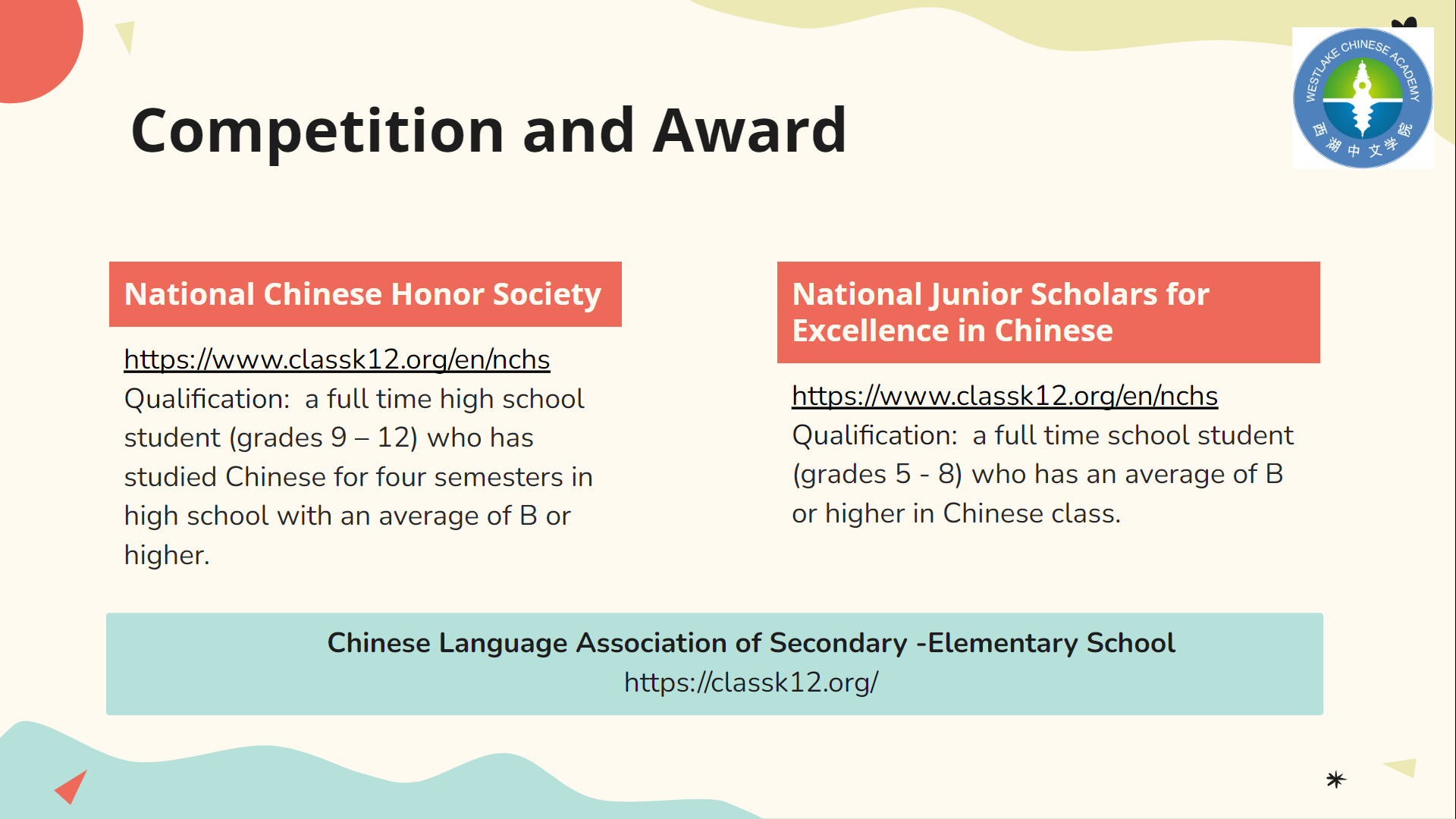
For middle school students, there's an opportunity to apply for the National Junior Scholars for Excellence in Chinese. To qualify, students must maintain an average grade of B or higher in their Chinese class. The application process requires submission through the student's Chinese teacher at an accredited school.
Next up, we'll introduce you to some exciting Chinese competitions you can participate in. First on the list is the Speech Competition. There's a prestigious national-level event called the "Chinese Bridge Speech Competition," organized by the Chinese Language Association of Secondary-Elementary Schools. This competition typically takes place in spring each year. Participants are required to deliver a presentation speech along with showcasing their talents. If this piques your interest, we encourage you to reach out to your Chinese teacher to sign up. Please note that their website may not always have the most up-to-date information, so don't hesitate to reach out via email for further details.
For students in Texas, there's an excellent opportunity to participate in a state-level contest known as the "Great Houston Chinese Speech Competition." This event occurs annually in October. To apply, you can either submit your application through your teacher or directly by yourself. However, for more detailed information, it's essential to reach out to your Chinese teacher. They can provide you with all the necessary details and guidance for participation. If your Chinese teacher isn't already familiar with this competition, feel free to encourage them to reach out to us at Westlake Chinese Academy. We would be delighted to share all the pertinent details once the new contest information is published.
Now, take a look at the picture above, featuring our former student, Krupali, proudly displaying her 1st place award from this competition. It's a testament to her talent and dedication. What's more impressive? Krupali was admitted into Harvard in 2023. Stay tuned, as later in the presentation, we'll delve into her remarkable resume.
Moving on to the Essay Writing Competition. There's the "National CLASS Essay Contest," hosted by the Chinese Language Association of Secondary-Elementary Schools, which takes place annually in October and November. For detailed information, you can visit their website. Your Chinese teacher will handle the submission process for your essay. Each teacher can submit up to 10 essays. It's important to note that the teacher must be a member of the Chinese Language Association of Secondary-Elementary Schools and teach at an accredited middle or high school. Below, you'll see pictures of our students who achieved remarkable success in 2023, winning 9 gold medals, 1 silver medal, and 1 honorable mention. Their achievements speak volumes about their talent and dedication.
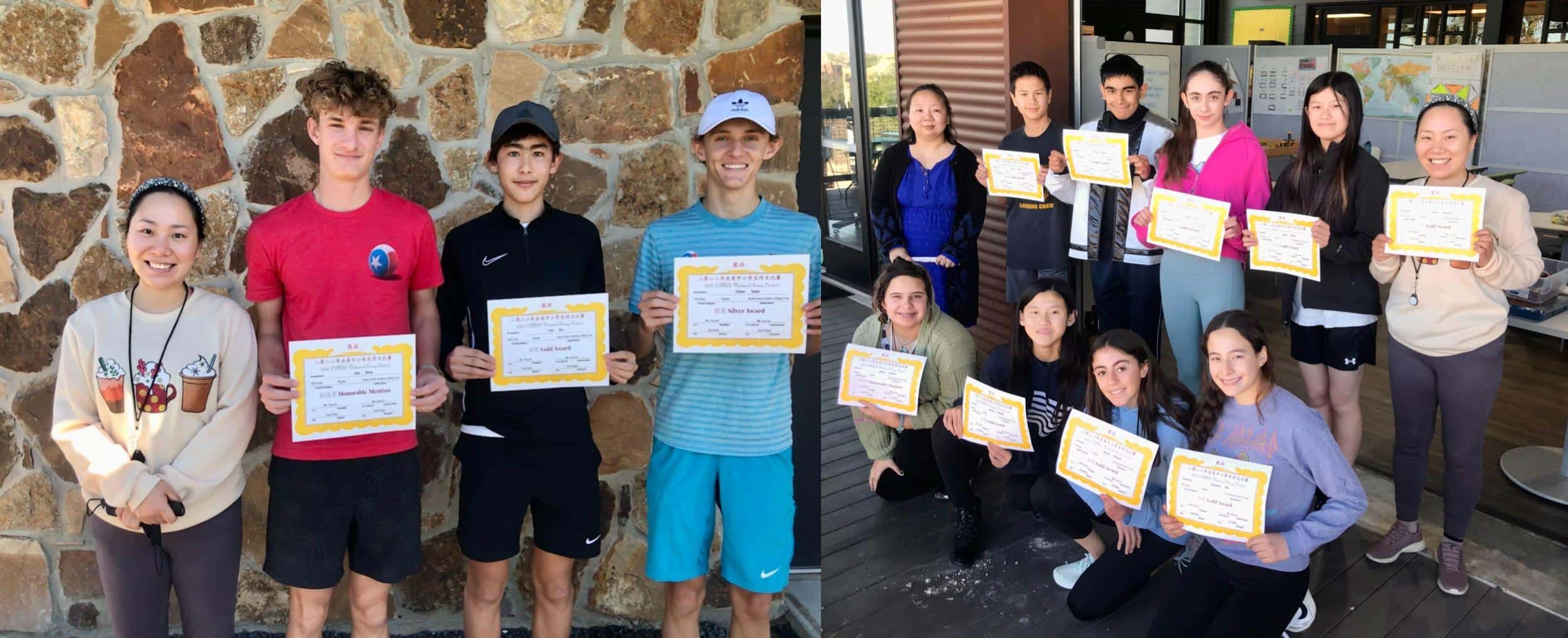
#3. Extra-Curricular Activity
Next, let's explore the various extracurricular activities and community services students can engage in. If your high school has a Chinese club, we highly encourage you to join and secure a position within it. This involvement can significantly enhance your college application. However, if your school doesn't have a Chinese club, don't fret! This presents a fantastic opportunity for you to take initiative and start one yourself. You could even become the president of the club, showcasing your leadership skills and initiative to colleges. Participating in Chinese club activities can greatly enrich your application. These activities may include celebrating festivals such as hosting a cookout for Chinese New Year or organizing mooncake tastings for the mid-Autumn festival. Additionally, you can arrange activities like watching Chinese movies, practicing calligraphy, engaging in paper cutting, and much more. These experiences demonstrate your cultural engagement and breadth of interests to college admissions committees.
#4. Community Service
Now, let's explore the various community service opportunities available to you. One option is to volunteer at a local Chinese cultural camp. Our school, Westlake Chinese Academy, offers counselor positions to high school students every summer. Later in the case study, we'll see that our former students who were admitted into UT-Austin and Duke University both gained valuable experience through volunteering at our Austin camp.
Another avenue to consider is volunteering abroad. Before the Covid pandemic, we facilitated trips to China for three weeks each summer, where students taught local children English and experienced homestays. Our former student Krupali, admitted into Harvard, participated in one summer, while another student, admitted into UC-Berkeley, volunteered for two summers. If you have the means to participate in a summer program abroad, consider choosing one that allows you to work while also experiencing a homestay with local families. This immersive experience is more valuable than solely focusing on studying Chinese language in a dormitory setting.
In November 2023, during an event in San Francisco, Chinese President Xi Jinping unveiled a significant new initiative aimed at fostering cultural exchange and understanding. The program invites 50,000 young Americans to study and engage in exchange programs in China over the next five years, creating opportunities for young individuals to explore and connect with the world. To support this vision, the Young Envoys Scholarship (YES) program was established, with the China Education Association for International Exchange (CEAIE) serving as its primary coordinator. Through the YES website, participants can explore a variety of sponsored exchange programs that delve into diverse topics and cultural experiences.
#5. Essay
Now, let's dive into the topic of essays. Many universities allow students to submit additional essays beyond the main one. If you have any multicultural experiences, the essay is an excellent opportunity to showcase what you've learned from these experiences. Here's a tip for essay writing: avoid duplicating information already provided in other parts of your application package. Each year, many students make the mistake of simply copying and pasting information from other sections of their resume. With only 650 words at your disposal, use this opportunity to provide the admission committee with insights about yourself that cannot be gleaned from other parts of your application.
#6. Stay Connected
Next up, let's discuss some tips on how to stay connected with college admission teams and demonstrate your strong interest in their schools. If financially feasible, consider visiting the colleges you are genuinely interested in and be sure to sign in at their reception desk. If there's a particular major or lab at the college that piques your interest, schedule an appointment to meet with the professor. The admission committee takes note of these interactions and considers them as indicators of your level of interest.
Many colleges send their admission committee members to host seminars in high schools each year. Attend these seminars and ensure you sign in with your name and email. In the past, highly-qualified students have missed out on admission opportunities simply because they failed to attend these on-campus seminars. Remember, the individuals hosting these seminars are likely the same ones who will review your application and make admission decisions.
Lastly, once you've signed up for colleges, you'll start receiving emails from them, including marketing emails. It's important to open every email and click on all the attached links because colleges can track whether you've opened their emails and engaged with the content. This engagement is also considered when measuring your level of interest.
Case Study
Alright, we've wrapped up our analysis on integrating Chinese language learning and cultural experience into every aspect of the application package. Now, let's delve into four case studies to examine how Chinese language and cultural experiences influenced the college admissions of these four students. We've organized these four case studies in order from a relatively weak resume to the strongest. This way, you can get a clear sense of how the resume progresses towards acceptance into the most elite schools in the U.S.
Case 1: UT-Austin Girl
Let's begin with the first case study, focusing on a former student who was admitted into UT-Austin, majoring in Design and Fine Arts. She achieved an unweighted GPA of 3.98 from a small private school with fewer than 20 students in her class. Her SAT score was 1310, with math at 620 and verbal at 690. Her transcripts showcased high school Chinese levels 2 to 5 from our school, Westlake Chinese Academy, including an AP Chinese course at level 5, though she did not take the AP exam. Additionally, she volunteered as a camp counselor at our Chinese camp in Austin for two entire summers. In her essay, she eloquently expressed how this counselor experience shaped her leadership skills and fostered a globally minded perspective. It's important to note that this student did not have access to other AP or honor courses due to her school's limitations. Furthermore, she did not receive any awards and had minimal extracurricular activities beyond submitting several pieces of her artwork. However, both the student and her parents acknowledge the significant role that Chinese language learning and cultural experiences played in her admission to UT-Austin. Additionally, she secured a substantial scholarship that waived her entire freshman year tuition.
Case 2: Duke Girl
Next up, we have a former student admitted into Duke Kunshan University, majoring in computer science. Duke Kunshan University is Duke University's new campus located in Kunshan, China. Students who attend Duke Kunshan receive the same diploma as those studying at Duke's main campus in the United States. Duke Kunshan is a unique campus, with two-thirds of the students being Chinese nationals and the remaining one-third being foreign students. All classes are conducted in English at Duke Kunshan.
This student boasted a weighted GPA of 4.0, ranking in the top 4% of a large public high school with approximately 1000 students in her class. She maintained straight As on her high school transcripts. Her SAT score was an impressive 1490. She took five AP courses, including Physics, Calculus, Chemistry, English, and Chinese, and achieved high scores of 5 in most of them.
Additionally, she received several notable awards, including the National Merit Commended Scholarship for ranking in the top 3% nationally on the PSAT test, and the AP Scholar with Distinction award for scoring 3 or above on five or more AP exams. Furthermore, she received a tennis scholarship from her high school. In terms of extracurricular activities, she volunteered as a counselor at our Chinese camp in Austin for one summer.
This student received admissions offers from both UT-Austin and Duke Kunshan University. Admission to UT-Austin was automatic due to her high class ranking. For Duke Kunshan University, she underwent a successful interview focusing on her motivations for joining the university.
She obtained recommendation letters from her AP English, AP Calculus, and AP Physics teachers. It's worth noting the importance of including recommendation letters from liberal arts subject teachers, even when applying for STEM majors. As we discussed earlier, college admission committees seek well-rounded individuals, not solely focused on one dimension. Chinese language learning and cultural experiences played a significant role in her admission to Duke Kunshan University. Later, you'll learn about another student who also gained admission to this university. Duke Kunshan actively recruits students with proficiency in Chinese to ensure effective communication on their China campus. They also value relevant cultural experiences, which demonstrate the applicant's interest in Chinese culture.
Case 3: UC-Berkeley Girl - Cara
Next, let's discuss our former student, Cara, who was admitted into UC-Berkeley with an initial major in Chinese. However, after one year in college, Cara switched her major to Neuroscience and added a minor in Chinese.
Cara achieved a weighted GPA of 4.2, placing her in the top 11% of her public high school class. Her SAT score was 1370, and she scored a 31 on the ACT. She pursued several honors courses, including AP Environmental Science, in which she received a score of 5 on the exam. Additionally, she took AP English 1, 2, and 3, although she did not take the exams for these courses, and she also completed AP World History with a score of 4. Apart from these AP courses, Cara enrolled in numerous classes at a community college, significantly bolstering her weighted GPA. For recommendation letters, Cara obtained them from her biology and chemistry teachers.
Cara received admission offers from seven universities, including three from the University of California system: UC-Berkeley, UC-San Diego, and UC-Riverside. Additionally, she was admitted to NYU and Stony Brook NY.
One of the most compelling aspects of Cara's resume is her extensive community service experience and involvement in extracurricular activities. She dedicated two summers to volunteering in our program in China, teaching local children English and immersing herself in homestays with local families. One of Cara's UC system college essays focused on her impactful volunteer and homestay experiences in China. In terms of extracurricular activities, Cara pursued sports medicine and wrote an essay about her work experience with a trainer team, specializing in sports injury treatment. Additionally, she obtained a haircut license through her study of cosmetology. Cara was active in cross-country running and track, and she held memberships in nationwide clubs such as the Red Cross and Key Club. Notably, she served as a Texas Advocacy Project Ambassador, primarily addressing issues related to sexual assault and domestic violence. One of Cara's essays submitted for UC-system detailed her experience in rebuilding an old truck, showcasing her diverse interests and skills.
During her interview, Cara emphasized the significance of her Chinese cultural experience in her admission to UC-Berkeley. She highlighted how it demonstrated her maturity, interest in learning, and readiness to immerse herself in new experiences and challenges.
Case 4: Harvard Girl - Krupali
#1. Course, Score and Recommendation Letter
She maintained an unweighted GPA of 3.96, ranking 63 out of 960 students in a large public school. Krupali achieved an SAT score of 1500, with a math score of 750 and a verbal score of 750. She took a remarkable total of 12 AP exams and earned a score of 5 in 8 of them. These exams include AP Statistics, Biology, US History, World History, Human Geography, English 1 and 2, Environmental Science, AP Chinese, French, Government and Politics, and Microeconomics. Given Krupali's aspiration to pursue a future career in law, it's notable that most of her AP courses and exams focus on liberal arts subjects. For recommendation letters, Krupali obtained them from her French teacher and Law teacher.
#2. Award
One of the most remarkable aspects of Krupali's resume is her impressive array of awards and achievements. She secured a prestigious U.S. Senate Youth Program Scholarship, a highly selective honor granted to only two students per state annually. Recipients of this scholarship have the opportunity to meet with senators and even the President of the United States. In addition, Krupali received the Congressional Gold Medal Award, a distinction bestowed upon approximately 3,000 students each year. She was also recognized as a National Merit Commended Scholar. Furthermore, Krupali clinched a 1st place award in a state-level Chinese speech contest and earned the esteemed National Security Language Initiative for Youth Scholarship.
#3. Community Service and Extracurricular Activity
In terms of community service and extracurricular involvement, Krupali participated in tennis during her freshman year, competing in various competitions. While she didn't pursue tennis beyond that, she engaged actively in several organizations and societies. Krupali was a member of the National French Honor Society, Interfaith Action of Central Texas, Generation Serve, Model United Nations, Refugee Services of Texas, National Honor Society, and Varsity Policy Debate. Notably, Krupali founded the Austin Liberation Youth Movement, demonstrating her commitment to social activism and community engagement. Additionally, she established a language tutoring company, where she provided tutoring services in French, Chinese, and Arabic to students. These initiatives showcase Krupali's leadership, entrepreneurial spirit, and dedication to promoting language learning and cultural exchange.
#4. Essay
At Harvard University, applicants have the opportunity to submit two essays. In her main essay, Krupali delved into her experience leading a protest in Austin, Texas, showcasing her commitment to social activism and advocacy. In her second essay, she shared insights from her volunteer work in both China and Morocco, illustrating how language and cultural immersion have enriched her life perspectives.
#5. Interview
During our interview with Krupali, we inquired about the role of Chinese language and cultural experience in her admission to Harvard. Krupali emphasized the versatility of Chinese proficiency across various fields, noting the rarity of Ivy League applicants with Chinese language skills. She stressed the importance of pursuing activities aligned with one's passions and authenticity. Krupali highlighted the significance of universities perceiving applicants as valuable investments and utilizing resources efficiently. Additionally, she mentioned that many Ivy League students admitted had proficiency in at least two foreign languages, underscoring the importance of language diversity in college admissions.
#6. Acceptance and Rejection
Krupali received acceptance letters from seven universities: Harvard, Columbia, Cornell, UCLA, Duke Kunshan University, UT-Austin Plan II (a liberal arts honors program), and UT-Dallas. She faced rejections from Yale and Stanford during the early action period.
Let's delve into some insights about college admissions. Each year, highly selective colleges receive tens of thousands of applications, acknowledging that many applicants are exceptionally qualified for their programs. However, with limited spots available, colleges must make decisions based on their specific needs, which can vary annually. For instance, one year a college may prioritize recruiting students who can afford full tuition, while in another year, they may aim to admit more students from low-income backgrounds. Another scenario to consider is if in the previous year, a university admitted disproportionately fewer students from a particular racial or ethnic group. In response, the following year, the university may seek to increase the representation of students from that specific demographic to foster greater diversity and inclusivity within their student body. It's crucial to understand that rejection from a university does not reflect inadequacy; rather, it signifies what the colleges need. Ultimately, there are numerous outstanding universities in the United States. Exceptional students will undoubtedly receive offers from great institutions.
Holistic Admission
Typically, the college application package comprises several key components: Courses and grades, SAT and AP scores, sports and extracurricular activities, community service involvement, awards and scholarships, recommendation letters, essays, interviews, legacy status, and family financial considerations. It may come as a surprise to some that family financial needs can significantly impact a student's admission. As previously discussed, colleges prioritize their specific needs when admitting students. For instance, if a college aims to enroll more full-tuition-paying students, they may hesitate to admit a highly qualified applicant who requires significant financial aid. This is because offering admission to such a student may result in them being unable to afford the tuition, leading to lower enrollment rates and potentially affecting the college's ranking. Therefore, colleges are meticulous when extending offers, prioritizing applicants they believe are more likely to accept, thereby safeguarding their enrollment rates and overall rankings.
College admission is far from a one-dimensional process. These days, institutions have embraced what's known as holistic admission. This comprehensive approach means that colleges consider every aspect of a student's life and achievements, assessing both the breadth and depth of their experiences and abilities.
Thank you all for reading this prolonged post. We've covered a lot of ground. Please feel free to contact us for any questions you may have.




